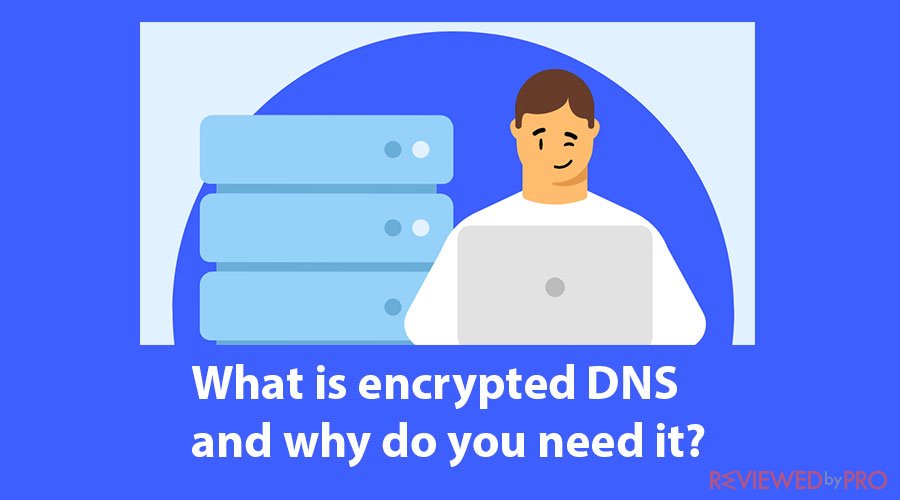
Encrypted DNS (Domain Name System) is a security feature that helps protect your online privacy and enhance the security of your internet connections. DNS is responsible for translating domain names (e.g., www.example.com) into IP addresses that computers can understand.
Traditionally, DNS queries are sent in plain text, which means that anyone monitoring your internet traffic can see the websites you visit and the domains you access. This lack of encryption leaves your online activities vulnerable to eavesdropping, data manipulation, and potential privacy breaches.
Encrypted DNS, on the other hand, ensures that your DNS queries are encrypted and secure, preventing unauthorized access and tampering. It adds a layer of privacy and security to your internet browsing by encrypting the communication between your device and the DNS resolver.
Here are a few reasons why you might need encrypted DNS:
-
Privacy: Encrypted DNS helps protect your browsing history from being intercepted or monitored by your internet service provider (ISP) or other third parties. It prevents them from seeing the specific websites you visit.
-
Security: Encrypted DNS helps prevent DNS hijacking, where malicious actors redirect your DNS queries to fake websites. By encrypting the DNS communication, it becomes difficult for attackers to manipulate or intercept your DNS traffic.
-
Circumvent censorship: In some regions or networks, access to certain websites may be restricted or censored. Encrypted DNS can help bypass such restrictions by hiding the websites you're accessing from network filters or firewalls.
-
Authentication: Encrypted DNS can provide an additional layer of security by ensuring that the DNS responses you receive are legitimate and haven't been modified or tampered with during transmission.
To use encrypted DNS, you can configure your devices or network settings to use a DNS resolver that supports encryption protocols such as DNS over HTTPS (DoH) or DNS over TLS (DoT). These protocols establish secure connections between your device and the DNS resolver, ensuring that your DNS queries are encrypted.
Popular encrypted DNS resolver providers include Cloudflare (1.1.1.1), Google Public DNS (8.8.8.8), and Quad9 (9.9.9.9). Many modern operating systems and web browsers also provide options to enable encrypted DNS within their settings.
Enabling encrypted DNS can help enhance your online privacy and security, but it's important to note that it doesn't provide complete anonymity or protect you from other forms of tracking or surveillance. It's just one component of a broader approach to safeguarding your online activities.
How encrypted DNS can help me?
Encrypted DNS can help you in several ways:
-
Privacy Protection: When you use encrypted DNS, your DNS queries are encrypted, meaning that the websites you visit and the domains you access are hidden from your internet service provider (ISP) and other third parties. This helps protect your online privacy by preventing them from monitoring or logging your browsing history.
-
Enhanced Security: Encrypted DNS adds a layer of security to your internet connections by protecting against DNS hijacking. It ensures that the DNS responses you receive haven't been tampered with or redirected to malicious websites. By encrypting the communication between your device and the DNS resolver, it becomes more difficult for attackers to intercept or manipulate your DNS traffic.
-
Bypassing Restrictions: In some regions or networks, access to certain websites may be restricted or censored. Encrypted DNS can help bypass such restrictions by hiding the websites you're accessing from network filters or firewalls. This can be particularly useful in environments where internet censorship is prevalent.
-
Trust and Authentication: Encrypted DNS can help ensure that the DNS responses you receive are legitimate and haven't been tampered with during transmission. By establishing secure connections to DNS resolvers, you can have increased confidence in the authenticity and integrity of the DNS data you receive.
-
Mitigating DNS-based Attacks: Encrypted DNS can protect you from certain DNS-based attacks, such as DNS cache poisoning or man-in-the-middle attacks. By encrypting your DNS traffic, it becomes more challenging for attackers to manipulate or exploit the DNS system to redirect you to malicious websites or intercept your communications.
It's important to note that while encrypted DNS offers privacy and security benefits, it doesn't provide complete anonymity or protect against other forms of tracking, such as cookies or device fingerprinting. Additionally, encrypted DNS focuses on securing DNS queries and responses, but it doesn't encrypt the actual content of your internet traffic.
To take advantage of encrypted DNS, you can configure your devices or network settings to use a DNS resolver that supports encryption protocols like DNS over HTTPS (DoH) or DNS over TLS (DoT). Many operating systems and web browsers offer options to enable encrypted DNS within their settings, or you can use third-party DNS resolver applications.
Remember that using encrypted DNS is just one component of a broader approach to online privacy and security. It's important to combine it with other measures such as using secure and up-to-date software, practicing good browsing habits, and being cautious of the information you share online.
Best encrypted DNS service providers
There are several reputable providers of encrypted DNS services, each with their own strengths and features. Here are some popular options:
-
Cloudflare (1.1.1.1): Cloudflare offers a free encrypted DNS resolver that supports DNS over HTTPS (DoH) and DNS over TLS (DoT). It focuses on speed and privacy, and their resolver is widely recognized for its performance. Cloudflare's DNS service is easy to set up and is available for both personal and enterprise use.
-
Google Public DNS (8.8.8.8): Google provides an encrypted DNS resolver that supports both DoH and DoT. It is known for its reliability and fast response times. Google Public DNS has a strong infrastructure and is frequently updated. It also offers additional security features like DNSSEC (Domain Name System Security Extensions).
-
Quad9 (9.9.9.9): Quad9 is a non-profit DNS service that focuses on security and privacy. It blocks access to known malicious websites and protects against phishing attempts. Quad9 supports both DoH and DoT and offers threat intelligence to enhance security. It's a popular choice for those seeking security-focused DNS services.
-
OpenDNS (Cisco Umbrella): OpenDNS, now owned by Cisco and branded as Cisco Umbrella, provides a range of DNS-based security services, including encrypted DNS. It offers advanced threat protection, content filtering, and other security features. Cisco Umbrella is primarily geared towards enterprise customers and provides robust security solutions.
-
NextDNS: NextDNS is a cloud-based DNS service that emphasizes privacy, security, and customizable filtering. It supports both DoH and DoT and offers a wide range of configuration options. NextDNS allows you to customize and block specific domains, filter content, and protect against trackers and malicious sites.
Choosing the best encrypted DNS provider depends on your specific needs, such as speed, privacy features, additional security measures, and ease of configuration. It's recommended to research and compare different providers to find the one that aligns with your requirements.
Additionally, some operating systems and web browsers offer built-in encrypted DNS options, allowing you to use their default providers. For example, Mozilla Firefox has Cloudflare as its default DNS over HTTPS resolver.
Remember that while encrypted DNS offers privacy and security benefits, it's important to understand the provider's privacy policy, their data handling practices, and any potential limitations or trade-offs associated with their service.




